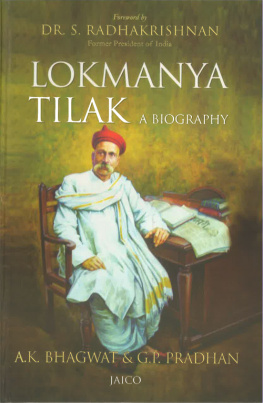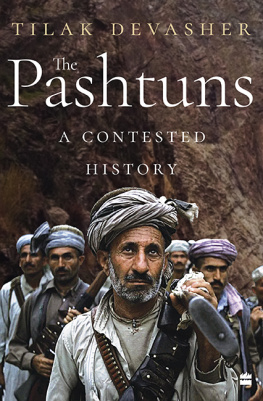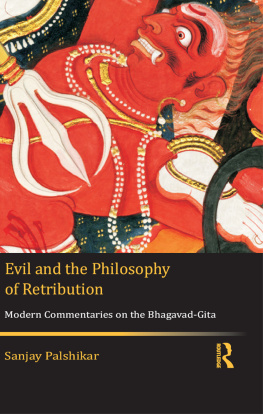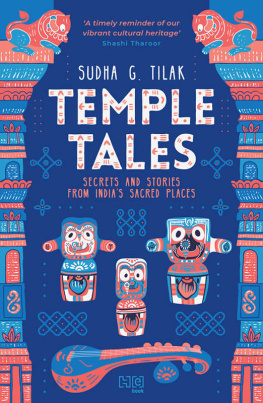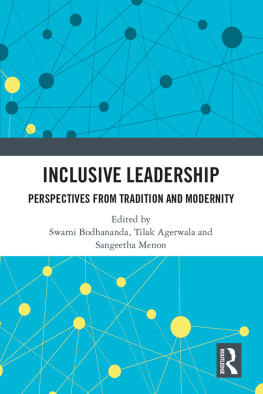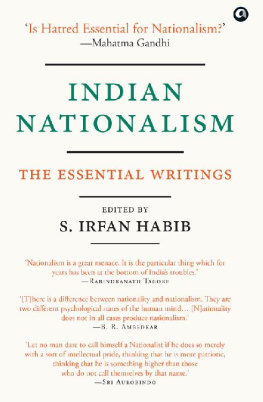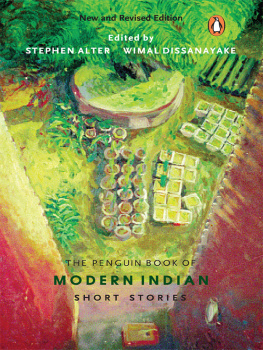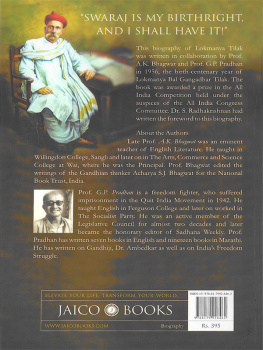Tilak Bal Gangadhar - Lokmanya Tilak: a biography
Here you can read online Tilak Bal Gangadhar - Lokmanya Tilak: a biography full text of the book (entire story) in english for free. Download pdf and epub, get meaning, cover and reviews about this ebook. City: Ahmedabad;India, year: 2008, publisher: Jaico Publishing House, genre: Religion. Description of the work, (preface) as well as reviews are available. Best literature library LitArk.com created for fans of good reading and offers a wide selection of genres:
Romance novel
Science fiction
Adventure
Detective
Science
History
Home and family
Prose
Art
Politics
Computer
Non-fiction
Religion
Business
Children
Humor
Choose a favorite category and find really read worthwhile books. Enjoy immersion in the world of imagination, feel the emotions of the characters or learn something new for yourself, make an fascinating discovery.
- Book:Lokmanya Tilak: a biography
- Author:
- Publisher:Jaico Publishing House
- Genre:
- Year:2008
- City:Ahmedabad;India
- Rating:4 / 5
- Favourites:Add to favourites
- Your mark:
- 80
- 1
- 2
- 3
- 4
- 5
Lokmanya Tilak: a biography: summary, description and annotation
We offer to read an annotation, description, summary or preface (depends on what the author of the book "Lokmanya Tilak: a biography" wrote himself). If you haven't found the necessary information about the book — write in the comments, we will try to find it.
Lokmanya Tilak: a biography — read online for free the complete book (whole text) full work
Below is the text of the book, divided by pages. System saving the place of the last page read, allows you to conveniently read the book "Lokmanya Tilak: a biography" online for free, without having to search again every time where you left off. Put a bookmark, and you can go to the page where you finished reading at any time.
Font size:
Interval:
Bookmark:
TILAK A BIOGRAPHY
Published by Jaico Publishing House
A-2 Jash Chambers, 7-A Sir Phirozshah Mehta Road
Fort, Mumbai - 400 001
www.jaicobooks.com
A.K. Bhagwat & G.P. Pradhan
LOKMANYA TILAK - A BIOGRAPHY
ISBN 978-81-7992-846-2
First Jaico Impression: 2008
Fourth Jaico Impression: 2011
No part of this book may be reproduced or utilized in
any form or by any means, electronic or
mechanical including photocopying, recording or by any
information storage and retrieval system,
without permission in writing from the publishers.
Printed by
Kaveri Printer, Delhi -92
FOREWORD
This biography of Lokmanya Tilak by Shri A. K. Bhagwat and Shri G. P. Pradhan is a valuable addition to the literature on this subject available in English.
There are different sides to Tilaks life of which the most prominent is his political contribution. He gave the dynamic message to us that Swaraj is my birth right and I shall have it. His force of character, moral conviction and the courage to stand up and suffer for the cause of Indias freedom are brought out vividly in this volume. Tilaks patriotism was a blend of political, moral and religious strands.
Tilak was not only a political leader but also a great scholar and journalist. His mind had a comprehensive sweep embracing ancient literature and modern science. He illuminated every subject he took up.
Tilak had faith in the validity and relevance of the ancient ideals of this country to modern life. His monumental work, the Gita Rahasya is a testimony to it. At a time when there is a great deal of insecurity and aimless drift in spite of frantic activity, he speaks to us of the need for inward discipline and compassion for man.
I have no doubt that this book will reveal to the readers the universality of Tilaks mind and essential faith in what one may call the family of man.
Dr. S. Radhakrishnan
PREFACE
It is sometimes disturbing to think afresh of the idols of ones early years. A discovery of the unknown facets of their personalities and also of their limitations make one doubt the validity of every judgment of ones past. We began studying Lokmanya Tilaks life and work with a similar misgiving. However, the multi-splendoured personality of Tilak, both as an individual and as a leader, was so absorbing that till the end we were oblivious of our initial apprehensions. During the days of our work we could recreate for ourselves the intellectual and political climate of the age of Tilak. We would cherish the memory of these days as one of the most exhilarating in our lives.
The competition sponsored by the All-India Congress Committee on the occasion of Lokmanya Tilaks birth centenary celebrations prompted us to undertake the writing of this book. We were singularly fortunate in having the guidance of the late Acharya S. D. Javadekar, a political philosopher of modern Maharashtra. He stimulated our minds, corrected some of our judgments, and helped us evolve a perspective on Tilak and his times.
The writing of this book was a labour, of love, which was made lighter and sweeter through the help of a number of persons. Of these we can only mention the following few to whom our grateful thanks are due:
Professors S. S. Murdeshwar, M. D. Hatkanaglekar, A. B. Shah and Shri G. M. Karmarkar helped us to finalize the manuscript. Shrimati Malavika Pradhan and Shrimati Meera Bhagwat stood by us throughout the strenuous period of our work. Shri J. H. Shah of Jaico Publishing House undertook the printing of the book and brought it out on time. We are indebted to the University of Poona for the grant-in-aid of Rs. 500 towards the cost of this book.
No words are adequate to express our sense of gratitude to Dr. S. Radhakrishnan who, in spite of his multifarious activities, wrote a foreword to this book.
A.K. Bhagwat
G.P. Pradhan
THE COMMON PLATFORM |
The imp r ession made by the first sentence that comes before us is more lasting than the one that comes later. That is why a particular type of education has to be given in childhood, declared Bal Gangadhar Tilak in 1908. The influences of childhood generally make a deeper impression and are more permanent. Very often they form a focus around which later impressions are grouped. Like a sensitive plant the young mind absorbs all that is congenial to it from the air, the soil and the growth around.
To understand correctly how Tilaks mind was moulded one has to go back to his childhood and see what ideas and impressions influenced him most. These ideas formed the structure of his mind and gave him a standard by which later day influences of books, men, and matters could be measured. Companionship in youth played a conspicuous part in serving to point his thoughts in a certain direction, giving him a clear line of action.
Tilak was born on the 23 rd July 1856, at Ratnagiri, in the Bombay Presidency, on the west coast of India, in a family of Chitpavan Brahmins. The people of this part have always been known to be hardy, industrious and practical; simple in their living and frugal in their habits. The Chitpavan Brahmins are known for their uncommon intellectual abilities and from the time of the illustrious Peshwas have earned a name for administrative as also martial qualities. In the British period, the Chitpavans were among the first to take to English education and filled many important positions with distinction.
Tilaks father, Gangadhar Ramchandra Tilak, popularly known for his Sanskrit learning as Gangadhar Shastri, was at first the headmaster of a primary school and later became an Assistant Deputy Educational Inspector. Though he did not have the advantage of an English education, Gangadhar Shastri was known for his learning, and earned for his knowledge of Sanskrit, the respect of such eminent Sanskrit scholars as Dr. R.G. Bhandarkar. The Tilak family came from the small village of Chikhalgaon of which they were the Knots. Tilaks grandfather, Ramchandra, was a storekeeper of the Peshwas before the Mutiny of 1857, and in his old age became a sanyasi. He left but little to his son, but the son, by dint of hard work and the frugality, characteristic of the people of the west coast, appeared to be fairly well off, particularly in his later days.
The birth of Tilak was a matter of particular rejoicing, because there had been three daughters before him in the family, and a son and heir was greatly desired. His mother Parvatibai, a devout religious woman, worshipped the sun so that she might be blessed with a son. The child was named Keshav first, but came to be known by the pet name Bal, given to him by his mother. This name, Tilak says, he continued in later life, to perpetuate his mothers memory. Tilak was sent to a primary school in 1861 and before his initiation had made very good progress in the traditional learning of the multiplication tables, arithmetic, Sanskrit declensions and synonyms from the Amarkosha.
In 1886, Tilaks father was transferred to Poona and took up lodgings in Budhwar Peth, in the heart of the city. Before Tilak entered the English school, his mother died and six years later he lost his father too, a few months before he entered college. In 1871, he was married to a girl of 11 from the Bal family, which also came from the Konkan. The Bals were known for their hospitality and charitable disposition and Tilaks father trusted Tilaks brother-in-law so much that at the time of his death he deposited with him all the money he had, without executing a bond of any kind. Tilaks grandfather lived at Kashi and Tilaks father wrote to him that he had an offer of marriage from the Bal family. The girl is plain and we shall not get much dowry. Many other better looking girls have also been proposed and we may get a dowry of more than Rs. 500. Tilaks grandfather replied that dowry or looks did not matter and that the girl from the Bal family should be chosen. Accordingly, Tilak was married at the age of 15.
Font size:
Interval:
Bookmark:
Similar books «Lokmanya Tilak: a biography»
Look at similar books to Lokmanya Tilak: a biography. We have selected literature similar in name and meaning in the hope of providing readers with more options to find new, interesting, not yet read works.
Discussion, reviews of the book Lokmanya Tilak: a biography and just readers' own opinions. Leave your comments, write what you think about the work, its meaning or the main characters. Specify what exactly you liked and what you didn't like, and why you think so.

